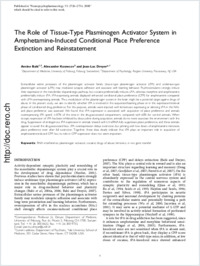The role of tissue-type plasminogen activator system in amphetamine-induced conditional place preference extinction and reinstatement
- Bahi, Amine Department of Medicine, University of Fribourg, Fribourg, Switzerland - Department of Psychiatry, Yale University School of Medicine, New Haven, USA
- Kusnecov, Alexander W. Department of Psychology, Rutgers University, Piscataway, USA
- Dreyer, Jean-Luc Department of Medicine, University of Fribourg, Fribourg, Switzerland
-
06.02.2008
Published in:
- Neuropsychopharmacology. - 2008, vol. 33, p. 2726–2734
English
Extracellular serine proteases of the plasminogen activator family (tissue-type plasminogen activator (tPA) and urokinase-type plasminogen activator (uPA) may modulate synaptic adhesion and associate with learning behavior. Psychostimulants strongly induce their expression in the mesolimbic dopaminergic pathway, but cocaine preferentially induces uPA, whereas morphine and amphetamine preferentially induce tPA. tPA-expressing animals displayed enhanced conditional place preference (CPP) for amphetamine compared with uPA-overexpressing animals. Thus, modulation of the plasminogen system in the brain might be a potential target against drugs of abuse. In the present study, we aim to identify whether tPA is involved in the acquisition/learning phase or in the expression/retrieval phase of conditioned drug preference. For this purpose, animals were injected with lentiviruses expressing or silencing tPA in the NAc and place preference was assessed. We found that tPA expression is associated with acquisition of place preference and animals overexpressing tPA spend >87% of the time in the drug-associated compartment, compared with 60% for control animals. When ectopic expression of tPA has been inhibited by doxycycline during acquisition, animals do no more associate the environment with the drug. Suppression of endogenous tPA expression in animals treated with LV-siRNA fully suppresses place preference, and these animals appear to avoid the drug-associated box. tPA overexpression delays extinction, but priming with low doses of amphetamine reinstates place preference even after full extinction. Together, these data clearly indicate that tPA plays an important role in acquisition of amphetamine-induced CPP, but its role in CPP expression does not seem important.
- Faculty
- Faculté des sciences et de médecine
- Department
- Département de Médecine
- Language
-
- English
- Classification
- Biological sciences
- License
-
License undefined
- Identifiers
-
- RERO DOC 12515
- DOI 10.1038/sj.npp.1301668
- Persistent URL
- https://folia.unifr.ch/unifr/documents/301441
Statistics
Document views: 191
File downloads:
- pdf: 162
